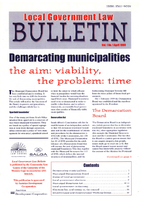Volume 1, Issue 1, April 1999
The Municipal Demarcation Board has been established and is working. It has very little time to fulfill the formidable task of demarcating municipalities. This article will outline the functions of the Board, its powers and procedures and the challenges which face it.
Over the past two months the Municipal Demarcation Board has focused on the following: Developing a framework within which the demarcation process would occur before the 2000 elections: Building an institutional base for the board: Finally, developing relationships with stakeholders and role-players. This report briefly outlines key aspects each of these.
The Constitutional Court has affirmed that the new constitutional order confers on local government the status of an autonomous and distinct component of government. Local government is no longer merely exercising powers delegated to it by the national or provincial government: Instead municipal councils are legislative assemblies and their legislative acts, which include levying taxes and adopting budgets, are not subject to administrative review by the courts. Although decided under the interim Constitution, the decision in Fedsure Life Assurance Ltd v Greater Johannesburg Transitional Metropolitan Council 1999 (12) BCLR 1458 (CC) reinforces the new and increased status the 1996 Constitution accords local government.
Recent amendments to the Constitution, read with certain provisions of the Municipal Structures Act, have the effect that the elections for local government, which were due to take place after October 1999, will now take place approximately one year later.
In less than two years time, South African citizens will for the first time elect their municipal councils in a fully democratic manner. At present, local government is in a transitional period and so is the law on elections for, and voting in, the municipal council. Many disputes, relating to this topic, found their way to court. it is important to look at how the courts see this transition and how they resolved thorny issues such as the role of minority parties in executive committees, traditional leaders in the council and the problem of councillors who the municipality money. This article deals with some of the questions on this topic that were raised in court.
The second pillar of new local government has been erected: on 18 December 1998 the President signed the Municipal Structures Act 117 of 1998 into law. This Act, which provides for the establishment of a new generation municipalities, came into operation on 1 February 1999.
Gauteng's Rationalisation of Local Government Affairs Act (RLGAA) 10 of 1998 came into effect on 19 March 1999 and brought local government in that province one step closer to the final phase of local government transformation.
The South African Local Government Association (SALGA), the body representing the local government sphere nationally, as well as its provincial affiliates have recognised the need to ensure that organised local government plays a meaningful role in shaping legislation transforming local government.
The second pillar of new local government has been erected: on 18 December 1998 the President signed signed the Municipal Structures Act 117 of 1998 into law. This Act, which provides for the establishment of a new generation of municipalities, came into operation on 1 February 1999.

